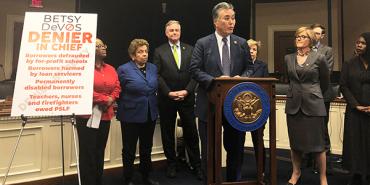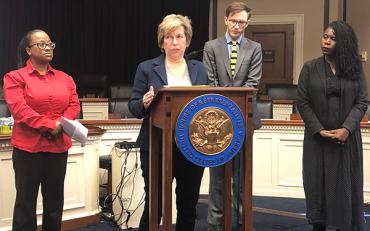Members of Congress grilled Education Secretary Betsy DeVos Dec. 12, and things got heated as they called her to task for leaving so many students out in the cold, refusing to relieve their student debt even when the “colleges” they attended failed them.
“When you’re the secretary of education, you should be doing everything to help [students],” said AFT President Randi Weingarten at a press conference following the hearing. Instead, by denying them student loan forgiveness, DeVos has denied borrowers the promise of an affordable higher education. “That’s why we call her the denier in chief,” said Weingarten.
The hearing, before the House Committee on Education and Labor, was designed to dig into the “borrower defense” rule, a Department of Education policy that relieves borrowers of their student loans if they used them to attend predatory for-profit colleges—institutions like Corinthian Colleges and ITT Tech, both shuttered after their misdeeds came to light. These institutions guaranteed students jobs in their field but did not prepare them for the job market; their credits do not transfer to other programs, and the college name on their resumes is a mark against them. Still, DeVos insists that the students got some value out of the programs, and in a new iteration of borrower defense, she wants to grant only partial loan forgiveness.
Meanwhile, 200,000 borrowers are stuck in a backlog of applications for loan forgiveness.
“This denial of forgiveness is yet another example of DeVos and the Trump administration prioritizing wealthy for-profit companies and loan servicers over the needs of working people,” said Weingarten.
It’s also in direct opposition to what DeVos’ own department has recommended. In a recently uncovered memo, Department of Education staff recommended full loan forgiveness for borrowers who had attended Corinthian and ITT, saying that substandard education and false guarantees of employment were undeniable reasons for full relief under the borrower defense rule.
The committee pressed DeVos to square her position with her staff’s recommendations, but she said she had not read the memo. The meeting got heated as DeVos evaded questions, blamed the Obama administration for a backlog of unresolved loan forgiveness applications, and demonstrated little sympathy for borrowers abused by for-profit colleges. Committee members expressed disbelief that DeVos would not prepare for the hearing by at least reading the memo; others suggested she was corrupt, incompetent or both.
Meanwhile, borrowers like Keishona Mahone still struggle with their loan payments. “I did my part,” she said at the press conference, describing how she enrolled in college after raising her son on her own. “I applied myself, I sacrificed, I committed.” Yet today she has no degree, only debt—and she was denied loan relief, even though the school she attended, the Institute of Art-Chicago, lost its accreditation and closed abruptly in 2018.
Gloria Evans also spoke at the press conference. She was counting on education as her “way out of poverty,” but she wound up with $65,000 in student loan debt—and because she was misled by loan servicers, she still owes $58,000. Despite qualifying, she has been denied public service loan forgiveness and is part of the Weingarten v. DeVos case to enforce the policy.
“I think one of the only things this administration understands is litigation,” said Matthew Cortland, who had to fight for the loan forgiveness legally due to people experiencing “total and permanent disability.” Cortland, who has Crohn’s syndrome, said that his legal background—he is a lawyer—helped him win relief, but that “you shouldn’t need to be a lawyer to obtain borrower defense relief or public service loan forgiveness.”
Weingarten stood beside these borrowers and pointed out a “pattern of hurting students who have done everything the right way, harming them, pauperizing them. … The secretary of education should be doing everything to help students cut bureaucracy, to cut paperwork. Her performance today and the operation of the Department of Education with regard to student debt show she does anything but.”
The AFT will continue to work toward stronger loan forgiveness policy and is supporting a bill that would repeal DeVos’ borrower defense rule. https://actionnetwork.org/letters/repeal-the-devos-borrower-defense-regulation/ It should come to a vote early next year.
[Virginia Myers]


